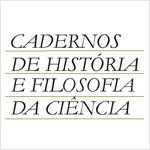What Underlies the Change from Potentiality to Possibility? A Select History of the Theory Matter from Aristotle to Avicenna
Série 3 v. 17 n. 2 • Cadernos de História e Filosofia da Ciência
Autor: Jon McGinnis
Resumo:
One of the most fundamental notions in the thought of Aristotle is the distinction between actuality and potentiality, which Aristotle links with the equally fundamental distinction between form and matter respectively. According to Aristotle, form, which brings with it actuality, and matter, which brings with it potentiality, are eternal and as such necessary. Consequently, on Aristotle?s view, neither form nor matter needs an efficient cause for its existence. Later thinkers?both in the Greek Neoplatonic tradition and Arabic falsafa tradition?believed that in fact form and matter, while being eternal, nonetheless did have an efficient cause, namely, God. In order to maintain this belief, however, these later thinkers needed to respond to certain arguments that Aristotle had presented, which identified existing for all time with being necessary, while anything that has an efficient cause is merely possible and so does not exist for all time. After briefly outlining developments in the late Greek-speaking world surrounding this issue concerning God?s causal relation to eternal forms and matter, I shall consider two theories presented in the Arabic-speaking world: first that of Abu Bishr Matta and second that of Avicenna and his criticism of Abu Bishr. What primarily sets Avicenna apart from other thinkers is that he closely links possibility (rather than potentiality) with matter. While this shift might seem small it opens up for Avicenna a whole new array of options that were not available to earlier philosophers.
Texto Completo: https://www.cle.unicamp.br/eprints/index.php/cadernos/article/view/591
Palavras-Chave: Causal relation, Abu Misr Matta, Motion,Modal

Cadernos de História e Filosofia da Ciência
Os Cadernos de História e Filosofia da Ciência dirigem-se especialmente ao público interessado nas áreas de Epistemologia, Filosofia da Ciência, Teoria do Conhecimento e História das Ciências. Têm por objetivo central a publicação de artigos e notas originais de pesquisadores nacionais e estrangeiros, traduções de textos concernentes aos temas mais centrais da reflexão filosófica, metodológica e histórica sobre a ciência, e traduções comentadas de textos marcantes do desenrolar histórico dessa reflexão, bem como resenhas nas áreas do conhecimento em que os Cadernos atuam.
